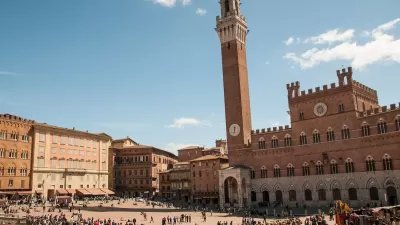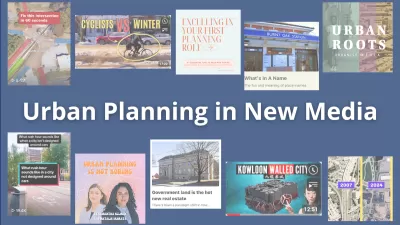“Urban Planning is Not Boring” is a podcast created by USC alumni Samantha Ellman and Natalie Ikhrata which highlights just how fascinating the field of planning can be.

While it may not be obvious to those outside the field, urban planning is actually very interesting, especially when one begins to understand how it impacts our daily lives and the places where we live, work, and play. To show how relevant and important planning is, University of Southern California (USC) graduate students, Samantha Ellman and Natalie Ikhrata, created the podcast “Urban Planning is Not Boring” about a year ago.
The podcast connects urban planning to timely news events and social issues and has now reached 37 episodes, with Ellman and Ikhrata discussing topics ranging from affordable housing to natural hazards. The show has featured a wide variety of guests, including both practitioners and academics, giving listeners free, valuable insights into urban planning and its many sub-fields such as urban design, disaster planning, transportation planning, and affordable housing development.
Ellman and Ikhrata, who both graduated from USC in May with master’s degrees in urban planning, were inspired to start the podcast when they recognized that resources to explore urban planning outside the classroom were lacking. Not only were there very few planning-focused podcasts, those that were available were not very engaging, especially for students and young professionals.
To learn more about the podcast and its creators, please read the source article by Edhita Singhal.
FULL STORY: Two USC alumni create urban planning podcast

Trump Administration Could Effectively End Housing Voucher Program
Federal officials are eyeing major cuts to the Section 8 program that helps millions of low-income households pay rent.

Planetizen Federal Action Tracker
A weekly monitor of how Trump’s orders and actions are impacting planners and planning in America.

Ken Jennings Launches Transit Web Series
The Jeopardy champ wants you to ride public transit.

Philadelphia Is Expanding its Network of Roundabouts
Roundabouts are widely shown to decrease traffic speed, reduce congestion, and improve efficiency.

Why Bike Lanes Are Good: An Explainer for the US Transportation Secretary
Sean Duffy says there’s no evidence that bike lanes have benefits. Streetsblog — and federal agencies’ own data — beg to differ.

California Invests Additional $5M in Electric School Buses
The state wants to electrify all of its school bus fleets by 2035.
Urban Design for Planners 1: Software Tools
This six-course series explores essential urban design concepts using open source software and equips planners with the tools they need to participate fully in the urban design process.
Planning for Universal Design
Learn the tools for implementing Universal Design in planning regulations.
Ada County Highway District
Clanton & Associates, Inc.
Jessamine County Fiscal Court
Institute for Housing and Urban Development Studies (IHS)
City of Grandview
Harvard GSD Executive Education
Toledo-Lucas County Plan Commissions
Salt Lake City
NYU Wagner Graduate School of Public Service





























